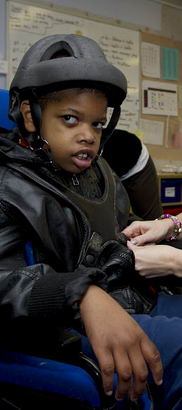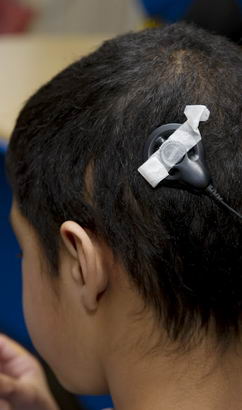
It may seem strange to include care in a curriculum document because, before the national curriculum was introduced, those with PMLD were often aught in 'special care' classes. Critics argued that this marked them out from education going on elsewhere and downgraded the concept of a separate PMLD curriculum (Byers and Rose, 1994).
If we continue to treat care as a necessary but largely time-wasting educational by-product -- something to be got over with quickly so that teachers can get back to real education -- we will never be able to develop a pedagogical case for care within the curriculum rather than as an addendum to it. This website is based on the belief that, for those with PMLD, care is far too important to be relegated to a side issue. It must become an essential part of the curriculum, otherwise we end up doing things to children rather than with them.

In 1990, only 20% of babies born weighing under 2lb would have survived; the figure for 2011 was 80%.
The second EPICure study into premature babies carried out in 2006 indicated that we are now able to save babies at 23 weeks' gestation; but, but there is an approximately 50% chance of some degree of disability, which means the baby might be in intensive care for several months.
'While medical conditions do not necessarily imply SEN, medical conditions have to be managed for effective education to take place.' Farrell (2006) pp 82
Carpenter (2010) warns of the increasing likelihood that the already recognised growth in the numbers of those born with PMLD in the 21st century (Male and Rayner, 2009; SEND Review, 2010) will throw up as yet unknown care requirements, which will in turn undoubtedly have a direct impact on learning styles and curriculum models.

Traditionally, curriculum models have concentrated on MSI, particularly with reference to visual and hearing impairments, without too much reference to the multitude of other difficulties.
Richard Aird, although warning against the primacy of care plans over learning in an educational setting (Aird, 2001), nonetheless recognises that care is an integral part of both the life and learning of someone with PMLD.
Consider the extent to which care is treated as a necessary but largely time-wasting educational by-product, something to be got over with as quickly as possible so that teachers can get back to the important issue of education.
How can care be made a real educational opportunity?

Aird, R. (2001) The Education and Care of Children with Profound and Multiple Learning Difficulties. London. David Fulton.
Ayers, H. (2006) An A to Z Practical Guide to Learning Difficulties. London. David Fulton.
Barber, M. (1994) Contingency Awareness: Putting Research into the Classroom in Coupe O'Kane J and Smith B (eds) Taking Control. London. David Fulton.
Byers, R. and Rose, R. (1994) Schools Should Decide ... in Rose R, Fergusson A, Coles C, Byers R and Banes D (eds) Implementing the Whole Curriculum for Pupils with Learning Difficulties. London. David Fulton.
Carpenter, B. (2010) Curriculum Reconciliation and Children with Complex Learning Difficulties and Disabilities. London: Specialist Schools and Academies Trust.
EPIcure 2 (2006) www.epicure.ac.uk/overview/overall-outcome2 accessed on 5th November 2011

Farrell, M. (2006) Celebrating the Special School. London David Fulton. Farrell M (2005) Inclusion at the Crossroads: Special Education Concepts and Values. London. David Fulton.
Goldsmith, J. and Goldsmith, L. (1998) Physical Management in Lacey P and Ouvry C. People with Profound and Multiple Learning Disabilities. London. David Fulton.
Johnson, M. and Parkinson, G. (2002). Epilepsy. A Practical Guide. London. David Fulton.
Kiernan, C. and Kiernan, D. (1994). Challenging behaviour in schools for pupils with severe learning difficulties. Mental Handicap Research, 7, 1. pp 17-20
Male, D. B. and Rayner, M. (2009). Who goes to special schools? Educational & Child Psychology (2009) Vol. 26 No. 4 pp.19-30
Ofsted (2010) Special Educational Needs and Disabilities Review 090221.